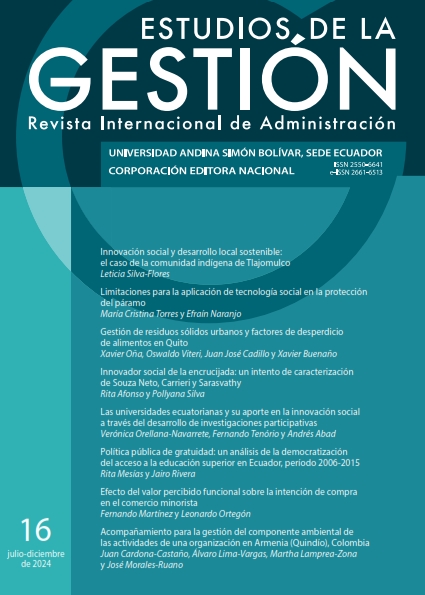Crossroads Social Innovator: An Attempt at Characterization Based on Souza Neto, Carrieri and Sarasvathy
DOI:
https://doi.org/10.32719/25506641.2024.16.4Keywords:
crossroads innovation, social innovation, virador, entrepreneurship in BrazilAbstract
Over the last few years, a context of poverty and uncertainty has been looming over the
future of Brazil, bringing an increase in cost of living and unemployment along with it. In the face of this scenario, it is necessary to look for other opportunities for work and remuneration. As such, entrepreneurship appears as a possibility to generate an income
source. Entrepreneurs do not always start businesses following conventional management theories, as they are subjects just looking for an opportunity to help them survive. This study looks for a possible characterization of the social innovator in a crossroads through the theories of three authors: Souza Neto, Sarasvathy and Carrieri, who focus on the entrepreneur performing social innovation, generating income for themselves and, most times, solving issues that have not been yet solved by the State in their territory. This study compares the aforementioned theories through an integrational literature review performed in
2022, with field observations of the researchers with entrepreneurs in peripheral areas as of 15 years ago. The objective is to characterize the social innovator in a crossroads in an attempt to extend the field of view to the small entrepreneur using gaps in the system, without systematic knowledge of management to perform their entrepreneurial activities.
Downloads
References
Afonso, Rita, y Luiza Sarayed-Din. 2021. “Social Innovations as a Driver for Social Change”. Climate Adaptation: Accounts of Resilience, Self-Sufficiency and Systems Change (1): 158-174. bit.ly/3rnnLc5.
---. 2023. “Inovações de encruzilhada e desenvolvimento sustentável no Rio de Janeiro”. Estudios de la Gestión: Revista Internacional de Administración (13): 55-74. http://hdl.handle.net/10644/9143.
Arrueta, Ivan, y Lorena Ribeiro. 2022. “A pobreza e o empreendedorismo social e solidário sob o enfoque da reciprocidade”. Em Repensando as políticas públicas: desafios dos direitos sociais e comunitários na atualidade, editado por Ivan Arrueta y Lorena Ribeiro, 35-53. Porto Alegre: Editora Fi.
Austin, James, Howard Steveson e Jane Wei-Skillern. 2012. “Social and Commercial Entrepreneurship: Same, Different, or Both?”. Revista de Administração 47 (3): 370-384.
BR. 2006. Lei Complementar n. 123. Diário Oficial da União de 14 de dezembro de 2006.
---. 2022. Quase 70% das empresas ativas no Brasil são MEIs, divulga Ministério. Acesso abril de 2023. https://bit.ly/40TCRCi.
Campelo, Graham. 2013. “Administração pública no Brasil: ciclos entre patrimonialismo, burocracia e gerencialismo, uma simbiose de modelos”. Ciência & Trópico 34 (2): 297-324. https://fundaj.emnuvens.com.br/CIC/article/view/871.
Carrieri, Alexandre, Denis Perdigão e Ana Aguiar. 2014. “A gestão ordinária dos pequenos negócios: outro olhar sobre a gestão em estudos organizacionais”. Revista de Administração 49 (4): 698-713. https://bit.ly/3ZQYjag.
Carrieri, Alexandre, Denis Perdigão, Paula Martins e Ana Aguiar. 2018. “A gestão ordinária e suas práticas: o caso da cafeteria Will Coffee”. Revista de Contabilidade e Organizações (12) e141359: 1-13. https://doi.org/10.11606/issn.1982-6486.rco.2018.141359.
Ferreti, Amanda, e Eloisio Souza. 2022. “Resistir para re-existir: compreensão dos discursos sobre gênero e empreendedorismo a partir de uma perspectiva crítica e interseccional”. Revista Livre de Sustentabilidade e Empreendedorismo (7): 6-38. https://bit.ly/46uh3QC.
Fundo Moneta?rio Internacional (FMI). 2022. World Economic Outlook: Countering the Cost-of-Living Crisis. Washington D.C.: FMI.
Global Entrepreneurship Monitor (GEM). 2019. Empreendedorismo no Brasil. Acesso março de 2023. https://bit.ly/3s0VTuf.
---. 2021. Empreendedorismo no Brasil. Acesso março de 2023. https://bit.ly/3zA7WiK.
---. 2022. Global Entrepreneurship Monitor 2022/2023 Global Report. Acesso março 2023. https://bit.ly/3mhfZ0G.
Haxeltine, Alex, Flor Avelino, Bonno Pel, Adina Dumitru, René Kemp, Noel Longhurst, Jason Chilvers e Julia Wittmayer. 2016. A Framework for Transformative Social Innovation. Bruselas: Transformative Social Innovation Theory.
Juliani, Douglas. 2014. “Inovação social: uma revisão sistemática de literatura”. Congresso Nacional de Excelência em Gestão. Anais do Congresso Nacional de Excelência em Gestão. Acesso março de 2023. https://cneg.org/anais/artigo.php?e=CNEG2014&-c=T14_0269.
Organização Internacional do Trabalho (OIT). 2023. World Employment and Social Outlook.
Ginebra: OIT. https://bit.ly/3KzE3oS.
Rede PENSSAN. 2022. 2o inquérito nacional sobre insegurança alimentar no contexto da pandemia da COVID-19 no Brasil. Acesso março de 2023. https://bit.ly/3Gj0L24.
Rufino, Luiz. 2019. “Pedagogia das encruzilhadas. Exu como educação”. Revista Exitus (4): 262-289. https://doi.org/10.24065/2237-9460.2019v9n4id1012.
Santos, Boaventura. 2019. O fim do império cognitivo. A afirmação das epistemologias do Sul. Belo Horizonte: Autêntica Editora.
Sarasvathy, Saras. 2001. “Causation and Effectuation: Toward a Theoretical Shift from Economic Inevitability to Entrepreneurial Contingency”. The Academy of Management Review 26 (2): 243-263.
---. 2008. What Makes Entrepreneurs Entrepreneurial? Darden Case No. UVA-ENT-0065. Acesso março de 2023. http://dx.doi.org/10.2139/ssrn.909038.
Sarasvathy, Saras, Nicolas Dew, Stuart Read e Robert Wiltbank. 2008. “Designing Organizations that Design Environments: Lessons from Entrepreneurial Expertise”. Organization Studies 29 (3): 331-350. https://bit.ly/3Mk7cWG.
SEBRAE. 2021. A taxa de sobrevivência das empresas no Brasil. Acesso outubro de 2022. https://bit.ly/3YojbGy.
---. 2022. “Dia da micro e pequena empresa evidencia a importância dos empreendedores para o Brasil”. Acesso março de 2023. https://bit.ly/3POMfEG.
Silva, Joanilson. 2018. “Empreendedorismo social: redes de relacionamento entre os stakeholders e parcerias para formação de competências pessoais e sociais no Instituto Favela da Paz”. Tese de pós-graduação. Universidade Paulista, São Paulo. http://bit.ly/432Ee3z.
Snyder, Hannah. 2019. “Literature Review as a Research Methodology: An Overview and Guidelines”. Journal of Business Research (104): 333-339. https://doi.org/10.1016/j.jbusres.2019.07.039.
Souza Neto, Bezamat. 2003. “Contribuição e elementos para um metamodelo empreendedor brasileiro: o empreendedorimo de necessidade do ‘virador’”. Tese de doutorado, Universidade Federal do Rio de Janeiro, Rio de Janeiro.












